CuriosID: Could Electric Cars Increase Pollution?
As part of WDET’s series CuriosID, a listener wonders if driving an electric car could actually create more pollution, since it would force power plants to generate more electricity to charge it, thereby generating more smog.
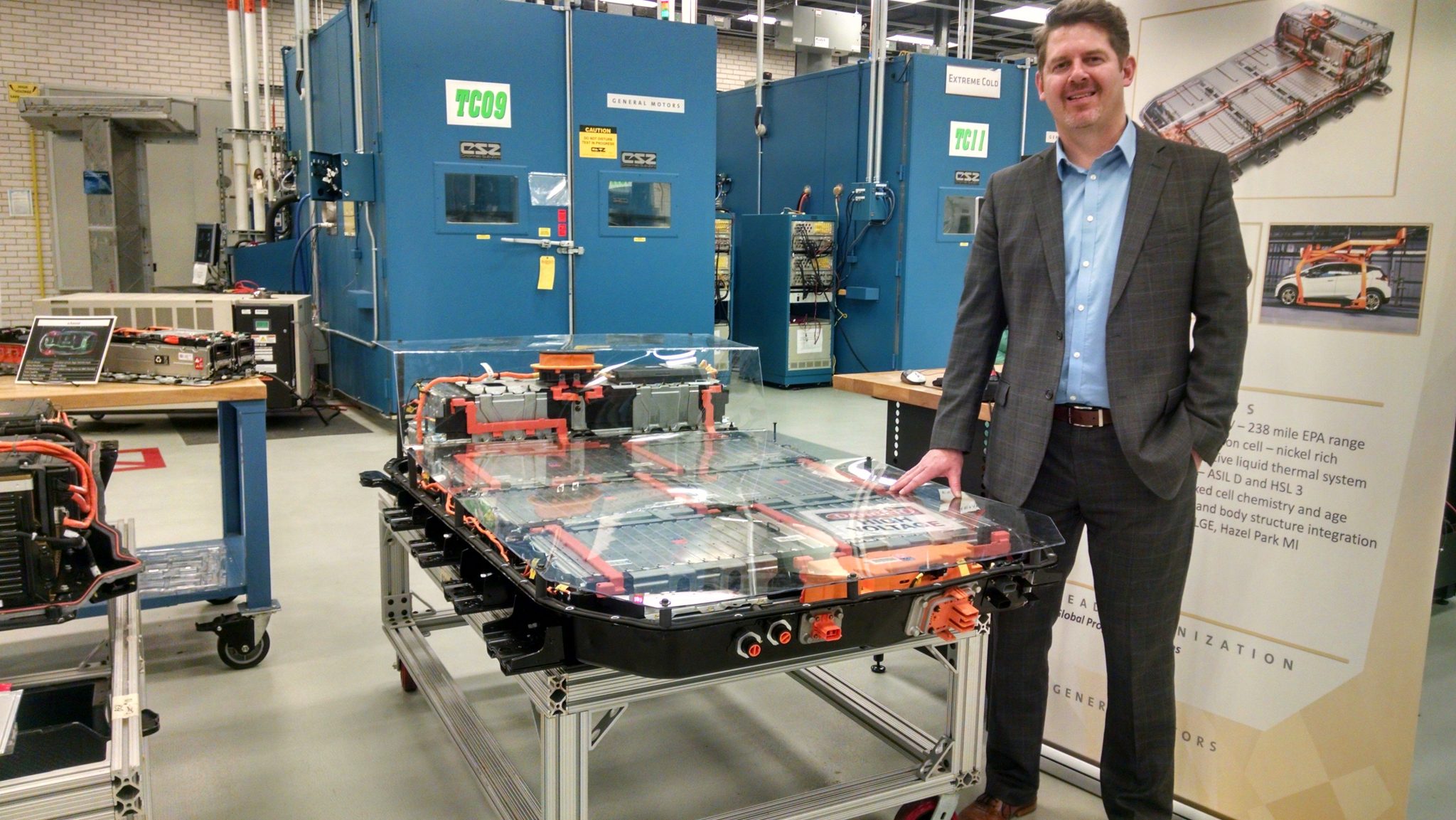

The question for this edition of CuriosID comes from listener Sharon Khouri:
“I’m wondering how much of Michigan’s electricity is generated still by coal? I’ve considered getting an electric car. But is it better for the environment if you’re using more electricity (and) it’s generated by ‘dirty’ energy?”
The Short Answer
Automakers have long said that vehicles powered by electricity are far kinder to the environment than those operating on gasoline or other fossil fuels. The electricity is generated in part by coal-fired power plants that pour out pollution. But Michigan utility officials pledge to move away from those older power plants. And researchers predict, if utilities meet their stated goals, less than half of the electricity generated for Detroit will come from coal.
Charging Into the Future
A building known as the Alternative Energy Center sits at the heart of General Motors’ Tech Center in Warren.
Inside is what GM officials call the largest battery lab in North America.
The space is surrounded by numerous large blue containers designed to simulate the harsh environments an electric battery might face, anything from arctic conditions to desert heat.
“The average American drives 40, 50 miles a day. For the (Chevrolet) Bolt EV that may only be a couple hours of charging depending on how powerful my charging system is.” – GM Senior Product Manager Darren Gesse
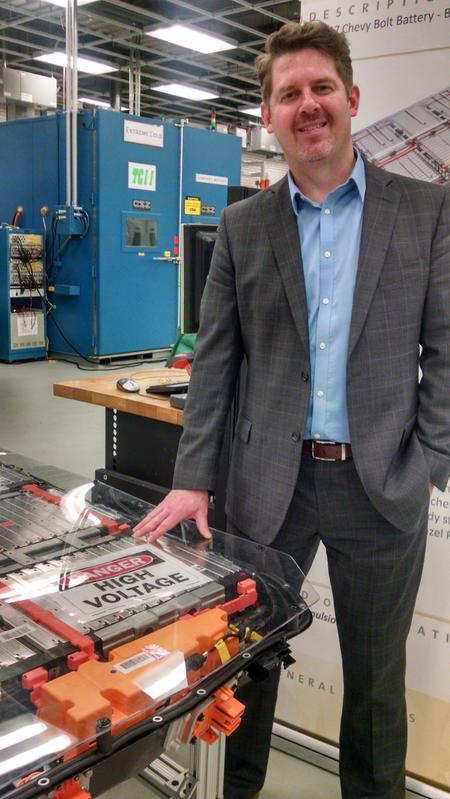
In the midst of them stands GM’s senior product manager for Chevrolet cars and electric vehicles, Darren Gesse.
He gestures at a nearby battery the size of a small dinner table, but only a few inches thick
It’s designed to power the Chevy Bolt EV.
Gesse says the batteries provide about 238 miles of driving on a single, full charge.
“The average American drives 40, 50 miles a day,” Gesse says. “So you’re thinking I got at least four or five days’ worth of battery charge onboard with the vehicle. Now if you do want to go to Grandma’s house or up to the cottage, that 238 miles will get you there and get you back.
“But if you think about it, I’m only driving 40, 50 miles a day. For the Bolt EV that may only be a couple hours of charging depending on how powerful my charging system is,” Gesse says.
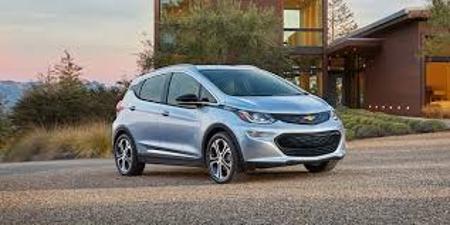
So charging batteries less often could mean firing up the power plant less often and creating fewer emissions.
Gesse adds that utilities can actually contain pollution at the source more effectively than automakers.
“It’s a lot easier to have a stationary, large emission control system than having a lot of little emission control systems on vehicles that go 75 or 80 miles per hour. I can put a better, cleaner, more stable emission control system at the utility plant than I can on a tailpipe,” Gesse says.
A Goal of Less Coal
But will charging an electric vehicle still result in a smaller overall carbon footprint than flooring a gas pedal?
To find out, our search headed to the utility company that produces electricity for most of southeastern Michigan, DTE Energy.
And we start right at the top, with the president of DTE Electric, Trevor Laurer.
He says DTE is on track to hit benchmarks required by the state to produce 15 percent of its energy from renewable sources like wind or solar.
But Lauer maintains that utilities in the Wolverine State want to move away from using dirty, coal-powered facilities anyway.
“A lot of the existing coal-fired power plants within the state of Michigan frankly are just getting pretty old. We have the opportunity to replace those with a different fuel source,” Lauer says.
“So companies like DTE have done a lot of math to look at this future and understand how we make this transition in a way that continues to add clean energy to our portfolio, yet keeps the generation reliable and affordable for all of the customers in the state of Michigan.”

Lauer estimates that drivers, especially in the Motor City, are the prime suspects for producing pollution in the future.
Lauer says, “The transportation sector will most likely be the largest contributor to the state’s carbon footprint by the mid-2020’s. So using battery-powered vehicles…will allow you to reduce the carbon footprint that you as an individual would have.”
In fact, Lauer says DTE believes enough in electric vehicles that the utility is investing in recharging stations.
Which, Lauer says, is not as easy as it might sound.
“You have to help the homeowner that has the ability to put a charging station in their garage. But you also have to make sure that this infrastructure is available for renters (or) those who need to recharge them at their business,” Lauer says. “We look forward to start to install more electric chargers across the state so that we can expand that infrastructure. We think it’s very important to partner with the Michigan auto industry on this.”
Automaker Tesla is developing a nationwide network of recharging stations, including some in the parking lots of Meijer stores.
But both the company and utilities have run into some roadblocks.
California-based Tesla has fought to be allowed to sell its electric cars in some states, including Michigan.
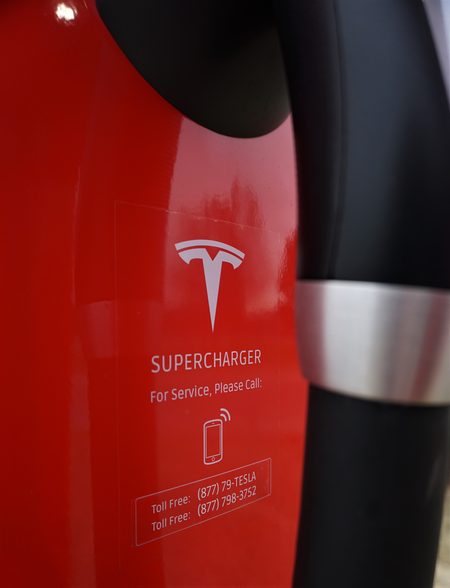
And power companies have faced questions about whether a utility could be considered a monopoly if it creates recharging stations.
Some have wondered if using extra electricity to run the vehicles would add additional costs to customers’ utility bills.
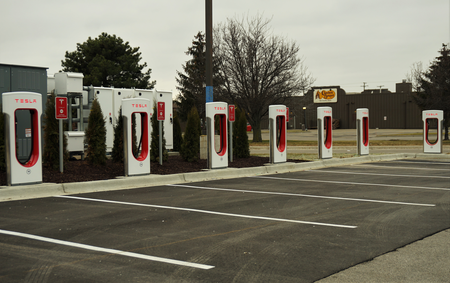
Cleansing the Sky
In the end, utilities like DTE and automakers like GM have a financial stake in this equation. They want to sell cars and electricity.
So for an outside view of the electric-cars-versus-increased-power-plant-emissions question, we turned our investigation to a man who specializes in examining such things.
“About 65 percent of Detroit’s electricity comes from coal. By 2023 that’s expected to fall below 50 percent. That means that electric vehicles will get cleaner to run.” – Researcher David Reichmuth, Union of Concerned Scientists
The Union of Concerned Scientists’ David Reichmuth says he’s compared the amount of emissions produced by electric vehicles compared to gasoline-powered engines, taking into account all of the steps necessary to get a particular fuel into a car.
“For an electric vehicle that includes mining, generating the power and distributing the electricity,” Reichmuth says. “For a gasoline vehicle it’s looking at getting the crude oil, making gasoline, getting it to the cars and then, of course, burning it in the engine. And the overall answer is that driving on electricity is cleaner than driving on gasoline. But there are differences depending on where you live.”
Reichmuth says people in Metro Detroit should breathe easier as time goes by.
That is, he says, if DTE stays true to its word.
“If you look at DTE, about 65 percent of Detroit’s electricity comes from coal. By 2023 that’s expected to fall below 50 percent. That means that electric vehicles will get cleaner to run.”
And there is the answer to Sharon Khouri’s question.
Those who build cars, provide electricity and analyze the effects of emissions on the environment all seem to be in agreement.
For a smaller carbon footprint, go big on electric vehicles.
If you have a question that you’re all charged-up about finding the answer to, you can let us know by going to wdet.org/curious.
CuriosID is also now available as a podcast on i-tunes.
About the Asker
Sharon Khouri is a service coordinator working with seniors and the disabled in Madison Heights. Khouri says, “I want to (believe) it would probably be good (to buy an electric vehicle) because you’re creating less emissions when you’re driving. But still, if I’m creating more emissions while I’m charging, I’m not positive.”

